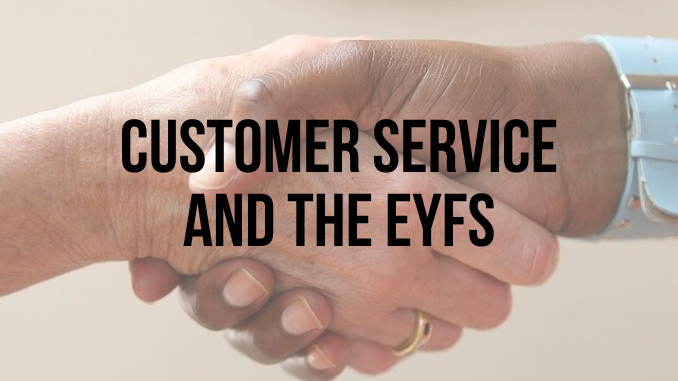Early Years settings exist in a strange and unique tension between the education and care sectors. The names by which we call settings demonstrate this tension between the two sectors; on the one hand we have childminders, nannies and nurseries (emphasising the caring nature of the setting) and on the other preschool, nursery school and Foundation or ‘Early Foundation’ classes (assimilating themselves with ‘school’ and education) Similarly, staff get called ‘teachers’ ‘nursery nurses’ and ‘practitioners’ and sometimes even ‘aunties’ demonstrating the mixed nature of the industry.
As those working in Early years we don’t typically think of the work that we do as ‘Customer Service’, and will more often identify ourselves as working within the ‘Education’ or ‘Care’ sectors. Whilst we absolutely do work in Education and Care, we work in Customer service too, whether we want to or not!
Working in Early Years means that you fulfil many different roles on a day to day basis and Customer Service is just one of those roles. Parents sacrifice huge portions of their salaries to send their children to childcare settings, many paying the same or more than they pay towards their mortgage. The setting’s service represents a huge investment to parents. Sure, they are paying for someone to care for their child’s physical needs whilst they are unable to, but they are expecting a great deal more than that, and rightly so!.
Whilst there is an argument that we should not ‘cater’ to parents and should always act in the best interest of children, using our knowledge as professionals, this does not have to be incompatible with providing good customer service to those who pay our wages. Using principles of good customer service and applying them to the childcare arena ensures better outcomes and experiences for parents and children alike. Here are some of the ways that settings can translate customer service principles into the Early Years sector:
Listen
First and foremost, listening is the most important principle of customer service in any industry; listening to your customers’ needs, perspectives, concerns or complaints is important because it’ll help you serve them better. When you listen, you begin to understand their perspective on issues and what is important to them so that you can solve problems in a way that caters best to them. Customers love to be listened to, and taking the time to listen well is one way to create a great experience for your customers. This might be as simple as spending a few extra minutes at drop-off or pick-up to listen to parents tell you some more about what their child has been up to at home, or it might mean setting up a parent panel or carrying out a questionnaire to understand parents thoughts, feelings and needs from the setting better.
Speed
There is nothing worse as a customer than feeling like your request has been ignored. Whether that’s a parent asking when their child will move up a room, emailing to request a swap in sessions or having a gripe to the manager. Action, and swift action at that, should always be the response! This doesn’t mean that you have to solve all problems right away, for example, acknowledging an email with “ Thanks for your enquiry, I’ll be able to confirm whether that’s possible by the end of next week” is perfectly acceptable (so long as you do respond by the end of next week!!) and it shows that the request has been heard and that action will happen within a timescale. Similarly, working on the ground, parents will often ask you questions you don’t know the answer to, for example, they may ask to clarify something that has been included in their invoice. It’s easy when your busy to say “I don’t know, you’ll have to ask the office” but it gives off a better impression if you offer an alternative option, for example “I’m afraid I don’t deal with the invoices, I can contact the office for you and have them get back to you, or you are welcome to go up and see Jane in the office now?” 9 times out of 10 the parent will still do it themselves, but you have come across as much more knowledge, caring and helpful, and if for whatever reason they are not able to deal with it themselves in this instance then you have still solved the problem!
Data
Data isn’t just for data geeks! It’s about getting to know the wants, needs, and values of your customers so seeking regular feedback and input from parents can help you to get your service just right. This is where parent panels, questionnaires and quick straw polls come in, all of these tools can be utilised to gain more information on your service.
Apologise
When you get something wrong (and you will!) say sorry. It sounds simple but sometimes we try to defend or advocate for our brand to the detriment of someone’s feelings. Often “We’re really sorry” is enough to smooth things over and move forwards to solutions.
Communicate well
Many of the problems or complaints we encounter in Early Years settings stem from poor communication, and muddled expectations. Train your staff to speak sensitively but accurately, and communicate (Via display boards, email, phone, newsletter and so on!) with your customers regularly. If communication is good you can avoid issues escalating into a complaint.
So, there you have just a few ways that good customer service principles might translate to the childcare arena. It’s important to remember that this is not about having parents dictate how we do our jobs; early years needs to established itself as a recognised and respected profession. Instead this is about providing a good level of service to those who sacrifice so much of their own salaries to pay ours.








